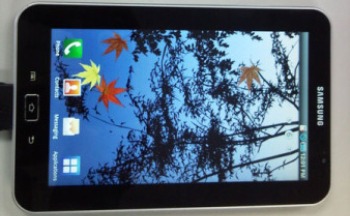

Tablet computers based on Google’s Android operating system will comprise 15 percent of the worldwide market in 2011, nibbling at Apple’s iPad share similar to the way Android smartphones gained on Apple’s popular iPhone.
That is the prediction from IMS Research, which also expects Android tablets to command 28 percent of tablet share by 2015. Some 15 hardware makers will sell Android tablets, including Samsung, Dell, Motorola and Cisco.
Samsung has made the biggest bet on Android tablets to date. The company expects to sell a million tablets in the Christmas season alone.
“The availability of Samsung’s Galaxy Tab tablet via mobile carriers such as AT&T in the US will quickly boost Google Android’s presence in the tablet market,” said IMS Research analyst Anna Hunt.
While Hunt did not address this specifically, Android will owe its rise to the iPad, which may command as much as 75 percent of the market or more by this time next year. The Apple tablet’s popularity soared soon after it launched, selling millions of units within the first few months clocking sales of 4.19 million in the fourth quarter alone.
At the recent Web 2.0 Summit in San Francisco, moderators asked industry luminaries such as media mogul Peter Chernin, Netflix CEO Reed Hastings and FCC chairman Julius Genachowski what they thought of the battle between Google and Apple for the mobile Web.
Genachowski said the new “apps economy” has created hundreds of thousands of jobs for software developers. That’s particularly true for Apple’s iOS platform which has more than 300,000 apps for the iPhone, iPod touch and iPad. Some 25,000 of those were designed specifically for the iPad. Apps for Android tablets such as the Galaxy Tab should prove fruitful next year as the hardware ships in earnest.
Apple has placed such a premium on quality content and apps for the tablet form factor that it forced hardware makers, such as Research in Motion and HP, to invest in OS technology to address this trend.
For example, RIM acquired QNX and HP snapped up Palm in July to gain the serviceable webOS platform for the Palm Pre. RIM is launching the BlackBerry PlayBook next year, while HP plans to offer webOS and Window 7 OS tablets next year.
Hunt questioned whether RIM and HP, which lack the broad application ecosystems Apple iOS and Google Android have fostered, will supply the content and user experience to lure consumers. Even so, some people will buy them on brand alone. Hunt said that next year almost eight percent of tablets shipped will run RIM’s QNX-based OS and HP’s webOS platform. This segment of non iOS and Android-based tablets is forecast to grow to 19.3 percent of unit shipments in 2015, proof that there is enough tablet pie to go around for the next half decade.
What about Microsoft tablets? The near-term future appears bleak, as Hunt wrote: “Considering the low number of announcements for tablets running Windows 7 OS, IMS Research forecasts that Windows will account for a very small percentage of tablet shipments during the next couple of years.”
However, HP said its Windows 7-based HP Slate 500 tablet PC, is on backorder due to “extraordinary demand”.
American space agency prepares for testing of Boeing's Starliner, to ensure it has two space…
As UK and Europe develop closer military ties, European Commission says it will invest €1.3…
Zuckerberg seeks to revive Facebook's original spirit, as Meta launches Facebook Friends tab, so users…
Notable development for Meta, after appeal against 2021 WhatsApp privacy fine is backed by advisor…
First sign of shake-up under new CEO Lip-Bu Tan? Three Intel board members confirm they…
Trump's nominee for SEC Chairman, Paul Atkins, has pledged a “rational, coherent, and principled approach”…